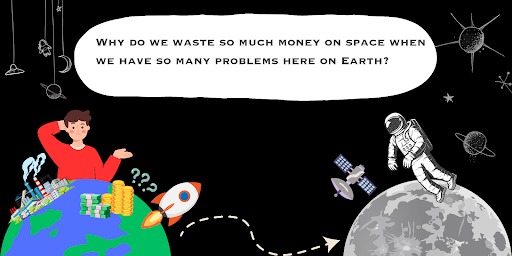The Case for Space
By Bhargabi Banerjee
“The universe is a place of mystery and wonder,” ~ Martin Rees.

Our very existence on this planet is an enormous mystery, and one key to unlocking the enigma of our origins and our place in the cosmos is space exploration. The best word to describe the link between the outcome of space exploration and our lives on Earth is mutualism. The money spent on space exploration directly benefits human society and advances our understanding of the globe. The money that is said to have been “wasted” is not at all misspent. Although the United States is the largest spacefaring nation, sources indicate that NASA’s funding barely accounts for 0.5% of the entire federal budget. This proportion is lower for other space-faring countries.
Concern over the Earth’s warming trend is growing as it causes unpredictable weather patterns, including extreme hot and cold temperatures, sporadic rainfall, and natural disasters like forest fires and floods. If this keeps up, growing food crops in the upcoming years may be exceedingly challenging and may result in a number of health problems. The answer to these issues may be found in the study of astronaut survival strategies and agricultural development in the harsh environs of space.
Space exploration can prevent humanity from being driven to extinction by providing a backup plan of survival choices just in case the planet should have to be abandoned. We frequently read in the news about asteroids traveling near Earth and the chances that they could strike the planet’s surface, and we know that, in the past, impacts from rather large objects have caused major issues, including mass extinctions. While no such large objects threaten extinction at this time, there are smaller asteroids that may still pose some problems. Data and observations collected on such objects that may one day strike the Earth help to reduce the risk of uncertainties. We may even one day soon be ready to alter the course of such possible impactors. For instance, the DART mission used the kinetic impactor approach to test the asteroid deflection method for planetary defense. It mimicked the system that NASA researchers would use if an asteroid were traveling towards Earth.
In terms of economics, space exploration is a return on investment (ROI) for any nation. It opens up employment opportunities for citizens. As kids, we often dream of going to space. Space exploration turns those dreams into reality. It motivates the youth to pursue their aspirations and encourages them to dream big, and motivated young people are an asset to the development of every nation. It drives curious minds to explore more of life beyond Earth and gives the impression that life is not confined to the sphere in which we dwell. For instance, Dr. Mae Jemison, an American physician and astronaut, was deeply inspired by space exploration and became the first African American woman to travel to space. She participated in NASA’s STS-47 mission as a mission specialist aboard the Space Shuttle Endeavour in September 1992. In addition to being a personal triumph, her trip to space served as an inspiration for many young people, especially girls and minorities. Her dedication to education and outreach have made her an inspiration to countless individuals, showcasing the transformative power of space exploration and its ability to inspire remarkable contributions to society.
King George, played by Corey Mylchreest in the Netflix series “Queen Charlotte”, rightly said, “There is something about the space, in this place where we live, where we are given so much power and attention, that it is good to remember, we’re a bit of dust and a small dot in the universe. It keeps one humble”. We human beings often take things for granted and forget to appreciate the resources that are readily available around us. We utilize the power bestowed upon us to exploit our natural resources, sometimes until they diminish. Studying space makes us aware of how fortunate we are to live on a planet that is habitable and has sufficient resources to cater to our needs.
Humans are capable of multitasking. They have made the impossible possible with their brilliant minds and creative solutions. The fact that there are many problems on Earth is unquestionably true, but that doesn’t mean that further research and exploration should be halted. In order to resolve these problems, advocacy and a change in perspective are what we need. Last but not the least, to cut long words short, it is the money invested in space exploration that will go a long way towards resolving some of the major problems facing the planet today and possibly in the future.
